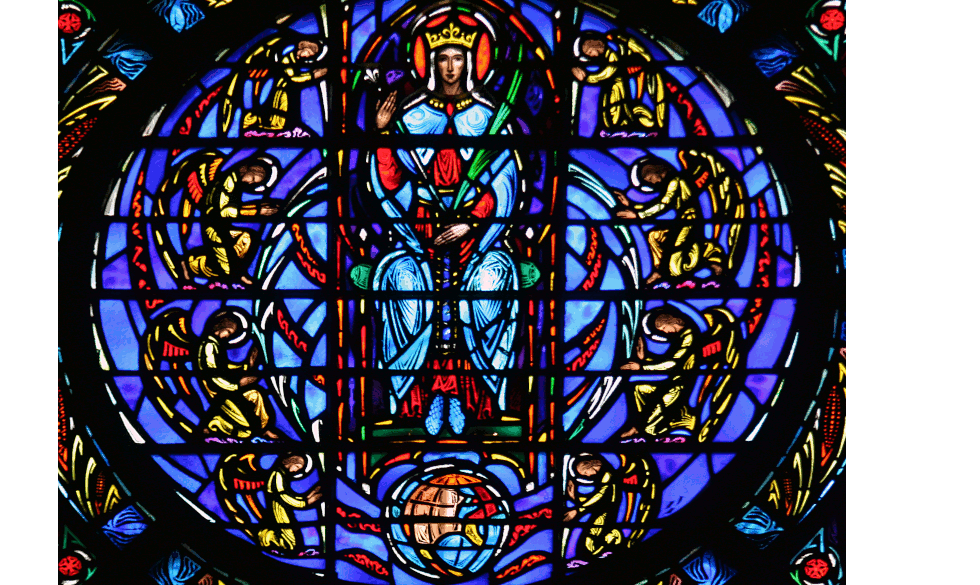Being Catholic but spending time among Christians from other denominations, once in a while the question about why Catholics put so much emphasis on Mary, mother of Jesus, comes up. Until recently I would have had difficulty answering that question as that was "just the way it is". However, that is not the best way to live out one's faith. One has to understand what one believes in order to explain, defend or share it with others, otherwise not having a firmly grounded faith based on reason is like living in a house built on sand - the first storms that come will wash it away. So why is Mary so important to Catholics?
To show why the Church gives Mary such a prominent role I am going to rely solely on scripture and lay out my case through a couple of steps:
- Show how the Davidic kingdom of the Old Testatment (OT) which resided in Jerusalem prefigures the kingdom of God - the Heavenly Jerusalem of the New Testament (NT)
- Look at the role and relationship of the mothers of the OT kings with respect to their sons and to Israel.
- Compare that with the role and relationship of Mary to Jesus and the church in the NT.
Let's start with point 1. After King Saul was rejected by God, God annointed a successor to Saul - that king was David, the descendants of whom he promised would rule forever. During king David's reign as king he captured Jerusalem and established his throne in the city (2 Samuel 5:6-12). So although David chose this city it was also chosen by God. Regarding the Temple and its location, In Deuteronomy 12:10-11 Moses told the Israelites, long before David became king, when they still had not settled the Promised Land:
You are about to cross the Jordan and live in the country given you by Yahweh your God as your heritage; he will grant you peace from all the enemies surrounding you, and you will live in safety; To the place chosen by Yahweh your God as a home for his name, to that place you must bring all the things that I am laying down for you: your burnt offerings and your sacrifices, your tithes and offerings held high, and all the best of your possessions dedicated by you to Yahweh.
Although David planned to build a temple to house the Ark of the Covenant, Nathan prophesied to David that his son Solomon would build the temple (1 Chronicles 17:12-13, 22:8-10, 28:3-7) During the reign of King Solomon the Temple was built and eventually became the central place of worship. David was also promised that "Your dynasty and your sovereignty will ever stand firm before me and your throne be for ever secure." (2 Samuel 7:16). Of course there are many Messianic prophecies in the OT that flesh out the meaning of the prophecy David received about his dynasty being "for ever secure" in a world where nothing lasts, such as Isaiah 23:5 "Look, the days are coming, Yahweh declares, when I shall raise an upright Branch for David; he will reign as king and be wise, doing what is just and upright in the country." In the NT in the book of Revelation 21:2, the author, John describes a vision:
Then I saw a new heaven and a new earth; the first heaven and the first earth had disappeared now, and there was no longer any sea. I saw the holy city, the new Jerusalem, coming down out of heaven from God, prepared as a bride dressed for her husband. Then I heard a loud voice call from the throne, 'Look, here God lives among human beings. He will make his home among them; they will be his people, and he will be their God, God with them...'
Clearly if the throne of David will be forever secure it must continue after the end of the world so who will be seated on the throne? From the NT passages in Revelation there is a new Jerusalem and someone on the throne. In Luke 1 the angel Gabriel tells Mary "Look! You are to conceive in your womb and bear a son, and you must name him Jesus. He will be great and will be called Son of the Most High. The Lord God will give him the throne of his ancestor David; he will rule over the House of Jacob for ever and his reign will have no end."
So from NT scripture we see from Revelation there is a new heavenly Jerusalem and Jesus himself will rule on that throne from which the "loud voice" called. So we see that the Davidic Kingdom of the OT prefigures Christ's kingdom - the heavenly kingdom, the new Jerusalem in which he reigns. And of course Mary is his mother through the mystery of the Incarnation. Not only that but Joseph, Jesus' foster father, is part of the dynastic line of David, as Matthew details in the first chapter. And "Following Jewish custom, Jesus received full hereditary rights through Joseph, even though he was adopted"1. Thus the promise to David made in 2 Samuel 7:16 is fulfilled in the NT.
So we see that the OT kingdom parallels the NT kingdom. They are both similar in their organization - one could say the Davidic kingdom of Israel is a figure or type of the new Jerusalem in the book of Revelation. Both are cities with a Temple, a throne and a ruler. And in both cases the ruler has a mother.
Next point 2. What is the role and relationship of the mothers of the OT kings? Let's start with an interesting passage in 2 Chronicles 15:16 "Even Ma'acah his mother, King Asa removed from being queen mother because she had made an abominable image for Ashe'rah. Asa cut down her image, crushed it, and burned it at the brook Kidron." This passage tells us two things. First, that the Davidic king's mother had a title and second, to remove the title as a punishment indicated that with it came certain privileges and status. (As an aside - Asa removed the title of queen mother from his mother because she had broken the first commandment by worshiping false idols - in this case Ashe'rah.) A second passage that reinforces this point is this prophecy from Jeramiah 13:18 of the upcoming Babylonian Captivity: "Tell the king and the queen mother, 'sit in a lower place, since your glorious crown has fallen from your head.'" Clearly the queen mother played an important role in the kingdom.
The respect the queen mother received from the king is clearly seen in the second chapter of the first book of Kings. We see the difference between how King David treated his wife Bathsheba compared to how her son King Solomon treated her once the throne passed on to him: In 1 Kings 1:15-16 Bathsheba approaches King David, "So Bathsheba went to the king in his room (he was very old and Abishag of Shunem was in attendance on him). She knelt, prostrated herself before the king, and the king said, 'What do you want?'". Contrast that with 1 Kings 2:19-21 "So Bathsheba went to King Solomon to speak to him about Adonijah; the king got up to meet her and bowed before her; he then sat down on his throne; a seat was brought for the king's mother, and she sat down on his right. She said 'I have one small request to make you; do not refuse me.' 'Mother,' the king replied, 'make your request, for I shall not refuse you.'" Notice the very different treatment Bathsheba received from her son, King Solomon compared to her husband, King David.
One other noteworthy point is that after the reign of King Solomon the country split into two kingdoms - Israel and Judea - the latter being ruled by the Davidic line. Through most of the bible, lineages given of important individuals are male. However, in the books of 1 and 2 Kings, only in the case of the Kings of Judea - the Davidic kings - is the mother's name of the king given. It is not given for the kings of Israel. Some typical examples. For Judah: "In the twentieth year of Jeroboam king of Israel, Asa became king of Judah and reigned for forty-one years in Jerusalem. His mother's name was Maacah descendant of Absalom. Asa did what Yahweh regards as right..." (1 kings 15:10-11). For Israel: "Nadab son of Jeroboam became king of Israel in the second year of Asa King of Judah, and he reigned over Israel for two years. He did what is displeasing to Yahweh..." (1 kings 15:25-26). This is another indication of the importance of the queen mother.
So what was the role of the queen mother? One role that we saw above was the role as intercessor. Bathsheba interceded on behalf of Adonijah. In that particular case it did not go well for Adonijah. His request cost him his life - because through it he was trying to usurp Solomon's throne and King Solomon saw through his deceit. None the less the queen mother could intercede on behalf of the people. A passage in Proverbs 31:1-9 gives us more information:
The sayings of Lemuel king of Massa, taught him by his mother:
What, my son! What, son of my womb!
What, son of my vows!
Do not expend your energy on women
nor your wealth on those who ruin kings.
Not for kings, O Lemuel,
not for kings the drinking of wine,
not for princes the love of liquor,
for fear that in liquor they forget what they have decreed
and pervert the course of justice against all the poor.
Procure strong drink for someone about to die,
wine for him whose heart is heavy:
let him drink and forget his misfortune,
and remember his misery no more.
Make your views heard on behalf of the dumb,
on behalf of all the unwanted;
make your views heard, pronounce an upright verdict,
defend the cause of the poor and the wretched.
It is not clear who Lemuel was. But but here we see that the mother of the queen also serves as a teacher and advisor to the king having the important role of forming him as he is growing up. Mary, the mother of Jesus would have been his teacher and though Jesus was without sin and divine as well as human, it is hard to imagine that she would not have taught him these values when he was young.
Which leads us to point 3. Let's start with the Visitation in Luke. This event highlights Mary's high position, for when Mary and Elizabeth meet, Elizabeth greets her with the words "Of all women you are the most blessed, and blessed is the fruit of your womb. Why should I be honoured with a visit from the mother of my Lord? Look, the moment your greeting reached my ears, the child in my womb leapt for joy." (Luke 1:42-44). Scripture does not indulge in flattery. This praise of Mary by Elizabeth was sincere. Mary responds with the Magnificat, a lovely counterpoint to the words of Elizabeth, and in it she says "Yes, from now onwards all gererations will call me blessed," (Luke 1:48). Indeed, these prophecies have come true: every generation since has called Mary blessed - through, for example, the Hail Mary.
Further on in the Magnificat "He has pulled down princes from their thrones and raised high the lowly" (Luke 1:52) At that time Mary would have been considered by everyone as a person of no consequence being betrothed to a carpenter...but now she is the mother of the "upright Branch for David" that Yahweh has now raised. These words of Mary are echoed by Simeon in the Temple during the Presentation after the birth of Jesus: "Look he is destined for the fall and rise of many in Israel" (Luke 2:34). With the new covenant things are changing - those who were important no longer will be and those of no consequence now will be raised up.
We also see from the NT that Mary has the role of intercessor for individuals and for the Church. In the Gospel of John 2:2-10 while at the wedding in Cana:
When the wine failed, the mother of Jesus said to him, "They have no wine." And Jesus said to her, "O woman, what have you to do with me? My hour has not yet come." His mother said to the servants, "Do whatever he tells you." Now six stone jars were standing there, for the Jewish rites of purification, each holding twenty or thirty gallons. Jesus said to them, "Fill the jars with water." And they filled them up to the brim. He said to them, "Now draw some out, and take it to the steward of the feast." So they took it. When the steward of the feast tasted the water now become wine, and did not know where it came from (though the servants who had drawn the water knew), the steward of the feast called the bridegroom and said to him, "Every man serves the good wine first; and when men have drunk freely, then the poor wine; but you have kept the good wine until now."
Here Mary is acting as intercessor as Bathsheba did in 1 Kings 2:19-21. However, in this case the outcome was positive. Six stone jars filled to the brim, each holding at least twenty gallons for a total of no less than 120 gallons. Assuming imperial gallons, that is 545 litres - next time you are in the dairy section take a look at the two litre milk cartons and imagine, if you can, 270 of them, each full of excellent wine! That was the minimum amount of wine Jesus blessed the wedding with. The commentary in my Ignatius Study Bible regarding the bridegroom whom the steward spoke to is: "The unidentified groom at the wedding. Jesus fulfills this role on a spiritual level"2 which leaves a question in my mind: was Mary then also playing a role on a spiritual level as intercessor?
Mary was also involved in the prayers of the faithful leading up to Pentecost - the arrival of the Holy Spirit which Jesus promised to send. Immediately after Christ's ascension into heaven, described in the first chapter of the book of Acts:
Then they returned to Jerusalem from the mount called Olivet, which is near Jerusalem, a sabbath day's jouney away; and when they had entered, they went up to the upper room, where they were staying, Peter and John and James and Andrew, Philip and Thomas, Bartholomew and Matthew, James the son of Alphae'us and Simon the Zealot and Judas the son of James. All these with one accord devoted themselves to prayer, together with the women and Mary the mother of Jesus, and with his brethren.
It is not hard to imagine this role continuing in heaven after her time on this earth.
So I hope I have presented my case for Mary's special role in the Catholic Church. I will let you decide on its merits.
References:
1. Ignatius Study Bible app, "Bible - Catholic Study", Ignatius Press, Augustine Institute, referring to Catechism of the Catholic Church, paragraphs 437, 496.
2. Ignatius Study Bible app, "Bible - Catholic Study", Ignatius Press, Augustine Institute.
Credits for what I have learned on this topic/resources:
1. St. Paul Center - This site has some very good teachings on the role of Mary
2. Formed - This site has an excellent 12 part series on Mary narrated by Matthew Leonard, called "The Bible and the Virgin Mary". You may have to sign up as an individual or through your parish but this site is well worth it.
3. Blog image from Wikimedia Commons (Sharon Mollerus)






